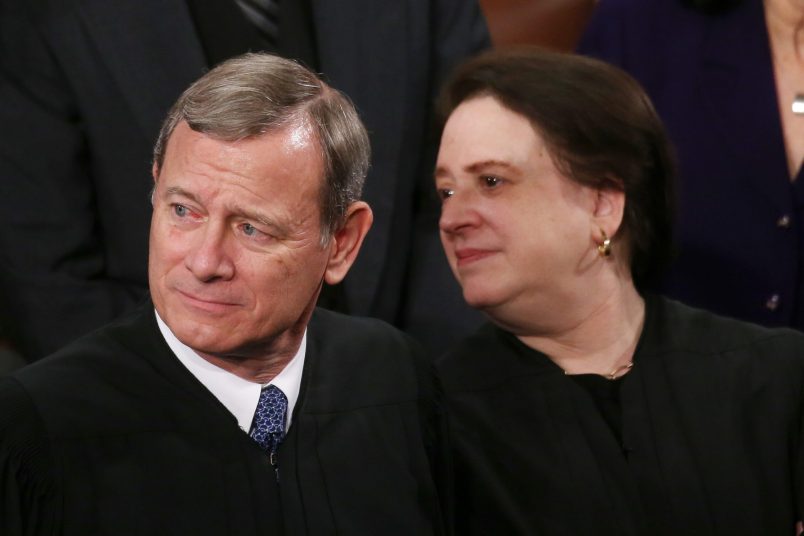Chief Justice John Roberts joined the liberals in a dissent Wednesday perhaps most striking for its final paragraph: a critique of the conservative majority’s frequent use of the shadow docket, in which Justice Elena Kagan writes for the group that “the Court goes astray.”
Louisiana and several other red states have not proven, she writes, that they will suffer irreparable harm from a district court knocking down a Trump-era Environmental Protection Agency (EPA) rule that made it easier to get permits for projects that could pollute navigable waterways.
Instead, the Supreme Court majority intervened to unblock the Trump administration rule while the case wends its way through the appeals court.
“That renders the Court’s emergency docket not for emergencies at all,” Kagan writes, joined by Roberts and Justices Sonia Sotomayor and Stephen Breyer. “The docket becomes only another place for merits determinations — except made without full briefing and argument.”
She adds that the majority is essentially using the docket as a messaging tool — where it preemptively “signals its view of the merits” — rather than what it’s meant to be, an emergency forum where decisions are needed on a quicker timeline than the usual course of briefings and arguments allow.
Roberts has joined the liberals in some recent dissents, perhaps most notably over Texas’ bounty hunter-style abortion law, but his signing on to the criticism of the conservatives’ shadow docket use is noteworthy.
Justice Amy Coney Barrett gave remarks Monday at the Ronald Reagan Presidential Library in which she urged people likely to perceive political bias behind coming decisions on abortion and gun rights to just “read the opinion.”
“Does it read like something that was purely results driven and designed to impose the policy preferences of the majority, or does this read like it actually is an honest effort and persuasive effort, even if one you ultimately don’t agree with, to determine what the Constitution and precedent requires?” she asked.
In shadow docket opinions like the one handed down Monday in Louisiana v. American Rivers, of course, there is no opinion to read. The conservative majority — Justices Brett Kavanaugh, Clarence Thomas, Samuel Alito, Neil Gorsuch and Barrett — granted the red states’ request for a stay wordlessly. All the public has to go off of is Kagan’s two-and-a-half page dissent.
The liberal justices’ critiques of the conservatives’ comfort in handing down significant opinions silently through the shadow docket have become common.
“Today’s decision is one more in a disconcertingly long line of cases in which this Court uses its shadow docket to signal or make changes in the law, without anything approaching full briefing and argument,” Kagan wrote in a February dissent after the conservative majority halted a lower court order requiring Alabama to redraw its congressional maps found to disenfranchise Black voters.
Then, the conservatives seemed unswayed by Kagan’s criticism.
“The principal dissent’s catchy but worn-out rhetoric about the ‘shadow docket’ is similarly off target,” Kavanaugh huffed in response.
Read the dissent here:







Roberts needs to do more than just agree with Kagan’s assessment that “the Court goes astray.” He needs to do something about it. Of course, he may not be aware he’s still Chief Justice.
“This isn’t shadow docketing because we say it’s not.”
So, Roberts doesn’t control the shadow docket?
Oh my God. The inmates really are running the prison?
ETA: Oh my double-God! Nobody has said no in 7 hours!
She went on to explain that while almost no one aside from other judges, law professors and a few lawyers will read any Supreme Court opinion, it’s a sure sign of its freedom from ideology if it contains some citations to other opinions written by the late Justice Scalia, a bit of Latin, and the use of one or both of the following phrases: “notwithstanding the foregoing” and “provided, however, that . . .”
Kavanaugh barely going through the motions: